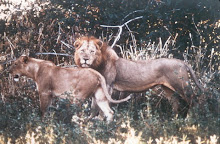If you have ever wondered about the origin of walking safaris in Africa, it might interest you to read what the legendary Norman Carr writes in one of his books – when he mentions the “game reserve” he is referring to the Luangwa Valley:
Trails in the Wilderness - Wilderness Trails
Not so many years ago I inaugurated a non-shooting type of safari with a difference, which I called ‘wilderness trail’. (Later known as “Wilderness Trails”.) It is virtually a walking tour in the game reserve, miles away from habitation or man-made tracks, with a trail of porters carrying one’s requirements in the traditional African manner; in fact little changed from the methods of Livingstone and Stanley.
Such a safari always brings back to me nostalgic memories of earlier times when the only means of transportation was on foot. It helps to recall, too, a sense of completeness, of peaceful unity with nature, and to conjure up idyllic scenes of animals grazing undisturbed in peaceful riverine glades, where there is always time to pause and study their uninhibited actions without any feelings of guilt because you are wasting somebody else’s time.
Time nowadays is a commodity that increases in value with each succeeding year. Every hour not spent rushing from one place to another seems to be a debit entry which will have to be accounted for on the Day of Reckoning. Time was invented by man and he has now made himself a slave to it. It is a pity, for it is impossible, traveling at thirty miles an hour, to get to know an area intimately and to reflect on the intricate relationship between the soils, the vegetation and the fauna.
Africa has now been opened up to the four-wheel-drive vehicle and a journey that used to take a month can now be accomplished in a day or so. Very little touring on foot is undertaken any more, even by field officers, who now take Unimogs and Halflingers into areas too much even for Land Rovers – horrible dinky-toy contraptions consisting of a platform on wheels propelled by noisy, smelly engines from which every animal flees.
How peaceful and revealing it is by contrast to sit in camp at the end of a day’s trek and watch, for example, a pair of white-headed plovers sharing their nesting duties. Their nest is a mere depression in the sandy riverbed – I think perhaps a ‘scrape’ is a better description – and they make no attempt to embellish it. The four cryptic buff-colored eggs are cunningly camouflaged and practically impossible to see against the background of sand and stones, which the bird has selected, as its nesting site. If anyone should approach, the plover will cheep and twitter hysterically, sometimes even dive-bomb you and then fly off to a patch of beach some distance off, performing all kinds of peculiar antics in order to divert your attention from the nest. How can you possibly enjoy these little domestic displays from the seat of a motorcar?
Then again, to talk around the campfire to men who have now become individuals rather than a line of porters carrying their burdens is an experience in itself. For any one of them has a lifetime of knowledge and anecdotes, which he is only too ready to impart. How else can you get to know the intriguing customs and traditions of these simple and natural people? How else unravel the apparently inextricable confusion between their own astute observations and their naïve acceptance of folklore? (Norman was deeply respected by the local people – and he had learned to speak the local language.)
It is to these trails that I look back with great pleasure. They are difficult to capture exactly, but I would like to give others an opportunity to savor something of the excitement, the glamour and the atmosphere of Africa as it used to be.
On this sort of safari I like to restrict my guests to four, for it is difficult for one leader to look after more than this number without a party becoming a crowd. Usually we break camp early in the morning, for that is the time when the animals are most active. You might catch sight of some of the night prowlers returning late to their hideout – a honey badger, a hyena, or even a lion before it settles down in the shade to laze away the heat-laden hours until the sun’s slanting rays become cool enough for him once again to pad his haughty way along the forest tracks.
http://www.fundednfree.com/normancarr.html
Thursday, April 23, 2009
Subscribe to:
Posts (Atom)

